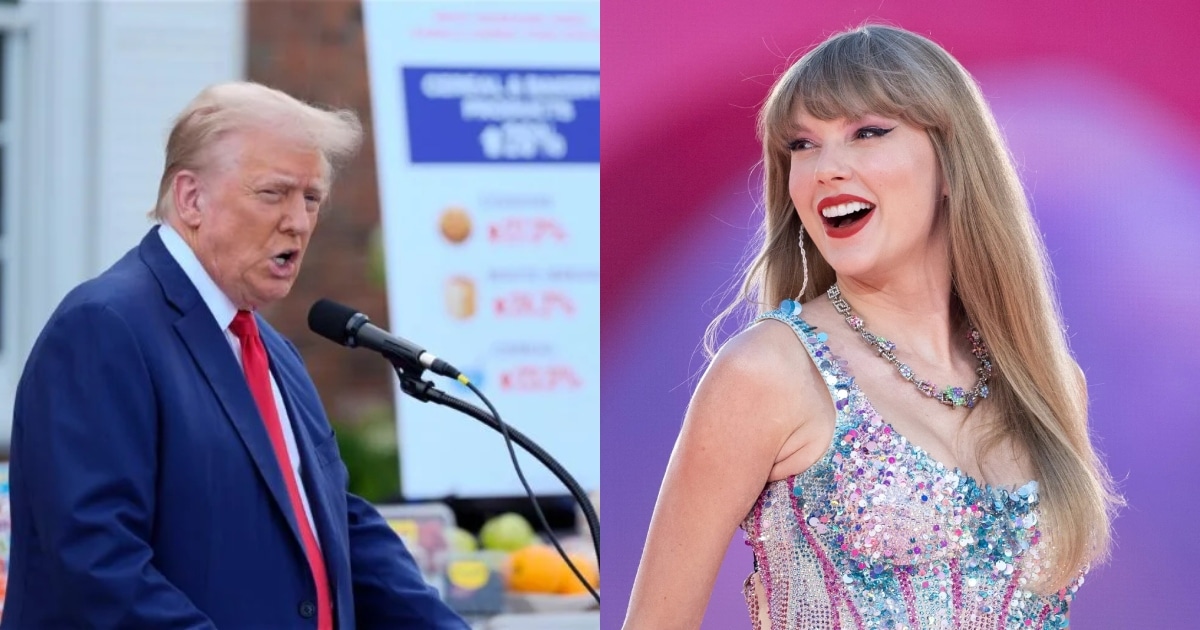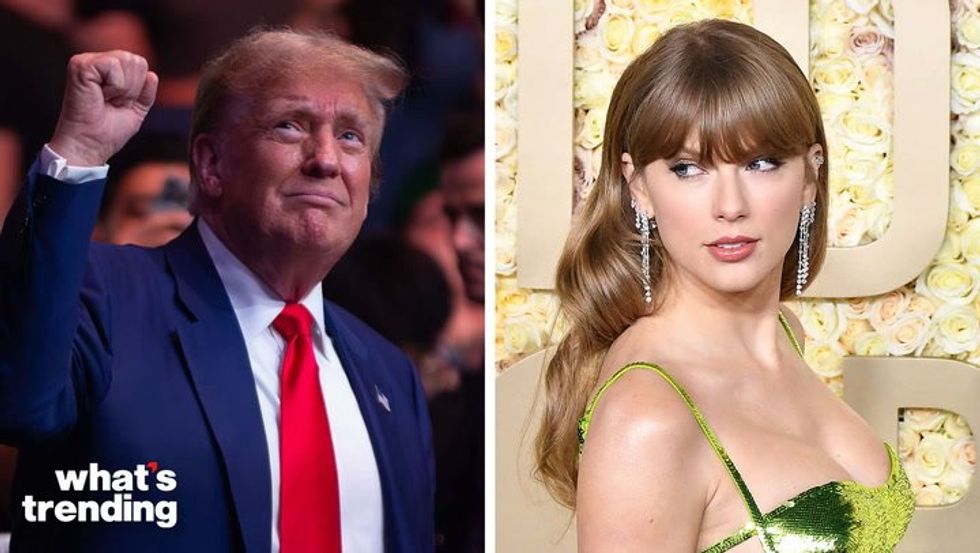In a startling turn of events that has sent shockwaves through both the political and entertainment spheres, former President Donald Trump has made headlines once again with a series of controversial posts on his Truth Social platform. On August 19, 2024, Trump shared multiple AI-generated images purportedly showing pop superstar Taylor Swift endorsing his presidential campaign. This bold move has not only reignited discussions about the role of artificial intelligence in political discourse but also raised questions about the ethics of using celebrity influence without consent. As the 2024 presidential race heats up, this incident serves as a stark reminder of the complex interplay between politics, technology, and popular culture in the modern era.
The Fabricated Endorsement: Unraveling Trump's Social Media Strategy

AI-Generated Images and Their Impact
In the digital age, the line between reality and fiction has become increasingly blurred, especially with the advent of sophisticated AI-generated imagery. Trump's recent posts on Truth Social exemplify this phenomenon, showcasing a series of images that appear to depict Taylor Swift supporters donning "Swifties for Trump" merchandise. These fabricated visuals are a testament to the power of AI in creating convincing, albeit false, narratives.
The use of AI-generated images in political campaigns is not entirely new, but the scale and audacity of Trump's recent move have caught many off guard. By leveraging the likeness of one of the world's most influential pop stars, Trump's team has demonstrated a willingness to push the boundaries of ethical campaigning. This tactic raises serious concerns about the potential for misinformation to spread rapidly through social media channels, potentially influencing public opinion based on falsified celebrity endorsements.
Moreover, the incident highlights the need for increased media literacy among the general public. As AI technology continues to advance, distinguishing between authentic and fabricated content will become increasingly challenging. This situation serves as a wake-up call for voters to approach political content on social media with a critical eye and to verify information from multiple reliable sources before forming opinions or making decisions.
The Power of Celebrity Endorsements in Politics
Celebrity endorsements have long been a coveted asset in political campaigns, capable of swaying public opinion and mobilizing voter bases. Taylor Swift, with her massive and dedicated fanbase, represents a particularly powerful potential ally for any political candidate. Her influence extends far beyond the music industry, as evidenced by her ability to impact voter registration numbers with a single social media post.
Trump's attempt to falsely claim Swift's endorsement underscores the perceived value of celebrity support in the political arena. By associating himself with a figure as beloved and influential as Swift, Trump likely hopes to tap into her younger, more diverse fanbase – demographics that have traditionally been challenging for him to reach.
However, this strategy is fraught with risks. Falsely claiming endorsements not only damages the credibility of the campaign but also potentially alienates the very supporters they hope to gain. Swift's fanbase, known for their loyalty and social media savvy, are likely to react negatively to such blatant manipulation of their idol's image and supposed political stance.
Legal and Ethical Implications
The unauthorized use of a celebrity's likeness for political gain raises significant legal and ethical questions. While parody and satire are protected forms of speech, the deliberate creation and dissemination of false endorsements could potentially cross legal boundaries, especially if they are deemed to be harmful to the celebrity's reputation or brand.
From an ethical standpoint, the incident highlights the importance of consent and authenticity in political discourse. By fabricating an endorsement from Swift, Trump's campaign has effectively attempted to co-opt her voice and influence without her permission. This not only disrespects Swift's autonomy but also misleads her fans and the general public.
The incident also raises questions about the responsibility of social media platforms in curbing the spread of misinformation. As AI-generated content becomes more sophisticated and prevalent, platforms like Truth Social, X (formerly Twitter), and others may need to implement stricter policies and more robust fact-checking mechanisms to protect users from false information.
Taylor Swift's Political Journey: From Silence to Activism

Early Career and Political Neutrality
Taylor Swift's evolution as a political figure is as compelling as her musical career. In her early years in the spotlight, Swift maintained a notably apolitical stance, rarely commenting on contentious issues or endorsing candidates. This neutrality was often attributed to her country music roots and the desire to avoid alienating fans across the political spectrum.
However, as Swift's career progressed and her influence grew, so did the pressure for her to use her platform for social and political causes. Many critics argued that her silence on important issues was a form of complicity, especially given her enormous platform and influence over young voters.
Despite this pressure, Swift remained largely silent on political matters throughout the early and mid-2010s. This silence became increasingly conspicuous as other celebrities became more vocal about their political beliefs, particularly during the 2016 presidential election.
Breaking the Silence: The 2018 Midterms
Swift's political awakening came in October 2018, when she broke her long-standing silence with an Instagram post endorsing two Democratic candidates in Tennessee for the midterm elections. This move marked a significant shift in Swift's public persona and was met with both praise and criticism from various quarters.
In her post, Swift not only endorsed specific candidates but also outlined her values and the issues that were important to her, including LGBTQ+ rights, gender equality, and racial justice. This detailed explanation of her political stance demonstrated a thoughtful approach to civic engagement and encouraged her fans to educate themselves on the issues and exercise their right to vote.
The impact of Swift's endorsement was immediate and substantial. In the 24 hours following her post, Vote.org reported a significant spike in voter registration, particularly among young people. This incident highlighted the potential power of celebrity influence in motivating political engagement among younger demographics.
Continued Activism and the 2020 Election
Following her initial foray into political activism, Swift became increasingly outspoken on social and political issues. She used her platform to advocate for causes such as LGBTQ+ rights, gender equality, and racial justice, often incorporating these themes into her music and public statements.
The 2020 presidential election saw Swift take an even more active role in political discourse. She explicitly endorsed Joe Biden for president, marking the first time she had publicly supported a presidential candidate. Swift's endorsement came with a strong critique of the Trump administration's policies and rhetoric, particularly regarding issues of social justice and equality.
Swift's political activism extended beyond endorsements. She used her social media platforms to encourage voter registration and participation, particularly among young people. Her efforts contributed to a surge in youth voter turnout in the 2020 election, demonstrating the tangible impact of celebrity engagement in the political process.
The 2024 Election Landscape: Celebrity Influence and Political Strategies
The Evolving Role of Celebrities in Politics
As the 2024 presidential election approaches, the role of celebrities in shaping political narratives and influencing voter behavior continues to evolve. The incident involving Trump's false claims about Swift's endorsement highlights the ongoing significance of celebrity influence in the political arena.
Celebrities, with their massive social media followings and cultural influence, have become increasingly important players in political campaigns. Their endorsements can sway public opinion, mobilize voters, and even impact fundraising efforts. This phenomenon has led to a blurring of lines between entertainment and politics, with many celebrities taking on more active roles in advocacy and campaigning.
However, the Trump-Swift incident also underscores the potential pitfalls of relying too heavily on celebrity influence. The backlash against false endorsements and the scrutiny placed on celebrities' political statements demonstrate that authenticity and credibility remain crucial factors in the court of public opinion.
The Impact of AI and Deep Fakes on Political Campaigns
The use of AI-generated images in Trump's false endorsement claim points to a larger trend in political campaigning: the increasing role of artificial intelligence and deep fake technology. As these technologies become more sophisticated and accessible, their potential to influence public opinion and spread misinformation grows exponentially.
Political campaigns are now grappling with the ethical and practical implications of AI-generated content. While some argue that such technologies offer new opportunities for creative messaging and voter engagement, others warn of the dangers of manipulation and the erosion of trust in political discourse.
The incident also highlights the need for improved digital literacy among voters. As AI-generated content becomes more prevalent, the ability to critically evaluate and verify information becomes increasingly important. Education initiatives aimed at helping voters navigate the complex landscape of online political content may become crucial in maintaining the integrity of democratic processes.
Strategies for Combating Misinformation in the Digital Age
In light of the challenges posed by AI-generated content and false endorsements, various stakeholders are developing strategies to combat misinformation in political campaigns. Social media platforms are implementing more robust fact-checking mechanisms and clearer labeling of potentially misleading content.
Media organizations are also playing a crucial role in debunking false claims and providing context for political statements. The swift response to Trump's false endorsement claim by fact-checkers and journalists demonstrates the importance of a vigilant and responsive media ecosystem.
Additionally, there are growing calls for legislative action to address the spread of misinformation in political campaigns. Proposals range from stricter regulations on the use of AI in political advertising to enhanced penalties for the deliberate spread of false information.
Video
Conclusion
The incident involving Donald Trump's false claims about Taylor Swift's endorsement serves as a stark reminder of the complex interplay between politics, celebrity influence, and technology in modern campaigns. As we move closer to the 2024 election, it is clear that the challenges posed by AI-generated content and the power of celebrity endorsements will continue to shape the political landscape.
This event underscores the need for increased media literacy, robust fact-checking mechanisms, and ethical guidelines for the use of AI in political campaigns. It also highlights the ongoing importance of authentic celebrity engagement in politics and the potential consequences of manipulating public figures for political gain.
As voters navigate this increasingly complex information environment, the ability to critically evaluate sources, verify claims, and make informed decisions becomes more crucial than ever. The Taylor Swift-Donald Trump incident may well be remembered as a turning point in our understanding of the intersection between politics, technology, and popular culture in the digital age.
{done
